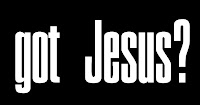
Today while driving my wife to go shopping (she doesn't drive), I tailgated a vehicle that had a little black bumpersticker "Got Jesus?" I've thought about having my inventor/mechanic son (number 3, born on Father's Day, he turns 23 next weekend) design and install for me a paint-ball gun behind the radiator screen on the front of my van. Then, I could paint-ball bumpers that desecrate the name of Jesus, like the one I just saw.

I live in hippie-dippy neo-pagan Oregon, but I work in whoopie-cushion Christian Washington state. Few things irritate me as much as using the motor vehicle, especially its more humble parts, as billboards to advertise one's make and model of Christianity.
"Only God" is another one of the stickers that I see, usually gracing the rear window of a car or pickup. "Real men love Jesus" was another one I saw last week.
Aarrrgh!!!

I believe that Orthodox deacons, presbyters, bishops, and monastics should go around in public in their "blacks." No, I don't mean just wearing
something black, I mean their
rassos or
anderis, or whatever they call them,
yeah, their black dresses! And I think they should wear their pectoral crosses if they have one. Yeah, and I think that they should have long hair tied back in a pony-tail and have at least a nice, trimmed beard, if not a full, shaggy one. I don't feel that it matters if clergy of other denominations, including Roman Catholics, wear their clerical "blacks" in public, but I
do think it's important that the Orthodox do.
Why? Because our faith cannot be gainsaid, cannot be ridiculed or opposed, because ours is the ground floor, the foundation of all the others, because
"we don't move the ancient landmarks set by our ancestors," and yet ours is the faith that does not grow old,
"planted by streams of water, yielding its fruit in season, its leaves never fading." So our men and women "of the cloth" should appear fully clad in their uniforms, just as policemen do in the keeping of law and order, because what they are keeping is even more powerful, more precious.

Years ago, when I was a young man living in Edmonton, Alberta, the Orthodox priests used to go about downtown in their "blacks" and I often witnessed the native people (who were Orthodox, usually) and living on the street, reduced to poverty and alcoholism, get up off their blankets and flock to the priests whenever they appeared, kneeling before them, weeping and kissing their hands, asking not for money, but for prayer and a blessing. Witnessing this touched me deeply, and affected me in two ways.

First, that our priests really
do represent not just the Church but
Christ Himself when they appear publicly in their garb, and thus He clothes them with power from on high. Second, that
any of us who are members of
the priestly and kingly race known as Christians have the
same calling, the
same ministry to the lost, and can always
walk with Jesus, ready to help
anyone He puts in our path, in whatever way is indicated. This has made me what I am, and why I wear this
attitude in place of my baptismal cross or icon button or whatever. I don't want to wear my decorations before I earn them. I don't want to put on my medal until the war's over and I've come through it alive. Anyway, that's my rationale as to why I don't purposely wear anything, especially an overt religious symbol, when I'm in the world. I used to do this when I was a young Christian (yeah, that's me in the picture), but there just came a day when I saw that it had to be
me and not
my flag that would draw people to me for help, because they could see I loved them, and not that I had a product to sell.
When I walk about in the world, at work, at shopping, out on the street, I often whistle a hymn from the Anglican hymnal (I have dozens memorised), one that anyone who’s ever gone to church would probably recognize.
Why? I just want to remind myself, and them, that
Jesus is near. I never go out anywhere without at least a pocket New Testament with me, that I can read while I'm sitting waiting for my oil change, or for my wife to finish shopping. When I go to the coffeehouse, alone or with a friend, I always try to have my Greek NT with me, and I like to read it for relaxation, out loud but softly. At work, my office cubicle has paper icons interspersed with family and friends' photos on the walls. So
yes, I
do have an appearance, a sign of the presence of Christ in my life, but it's not for show, it all has a purpose in which I live my life. Doing that unabashedly in public or in private, that's the way I let the shadow of Christ fall across my path. And if others notice the shadow, they may ask,
"Who's your Friend?"




























